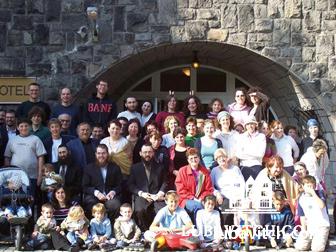(lubavitch.com) In a shift unheard of since pre-Nazi Europe, multitudes of Hungarians took to the polls last week in support of an extreme neo-Nazi party. As often happens in times of economic meltdown and general woe, far-right parties (representing anti-Semitic and racist views) come out on top.
Way on top in the case of the recent European Parliament elections in Hungary. Calling themselves “the movement for a better Hungary,” the Jobbik party captured an astounding 15 percent of the local vote. To the dismay of the local Jewish community, their website and politicians espouse hateful views on Israel, including its politics and people.
“The situation has developed over the past couple of years,” explains Rabbi Shlomo Koves from his home in Budapest. “The results are not totally unexpected. The surprise is that the far right received three times as many votes as what was originally projected.”
Though the party’s main prey has been the Gypsy community, Koves says that their growing popularity has enabled them to “say politically unfair and unacceptable statements about and to the Jewish community.”
The Hungarian Jewish community, where Koves serves as a Chabad representative, is the fourth-largest in Europe. Of its 100,000 members, 12,000 are Holocaust survivors, with the younger generation largely descendants of survivors. It is a community for whom anti-Semitism is a very real issue.
Koves’ own grandparents survived the Holocaust; both his parents were born soon after the war’s end. The Budapest-native was raised in a typical affluent Jewish family, discovering Chabad at the age of 12. Yeshiva in Israel and the United States followed soon after. In 2003, Koves was the first rabbi to be ordained in post-war Hungary.
Despite his own connection with the ghetto and camps, Koves tries to steer the community away from a Holocaust fixation. In this country where the local intermarriage rate is 60 percent, many Jews’ only connection with Judaism is the Holocaust or contemporary anti-Semitism. Because many have experienced the horrors of the Holocaust, they are too afraid to share their Jewish identity with their children. Another generation lost.
It doesn’t have to be like that, Koves stresses.
To prove their point, Koves and his mentor Rabbi Baruch Oberlander, have created a dynamic community in Budapest. A kindergarten and primary school educate 100 children. In Budapest’s main square, Chanukah menorah lightings attract 500 each night; 1,500 people crunch on matzah at public seders around the country; a monthly women’s club has 200 members.
Study is important to this well-educated, secular community. The Open Jewish University’s classes, on every conceivable Jewish topic, include 2,500 students. Prayerbooks, haggadahs, the Pentateuch, and children’s books have been printed in Hungarian by Chabad leadership. And to supplement the local rabbinate, young men study in the Pesti Yeshiva and assist with communal activities.
One of those students is Michael Rose, who spent last year in Budapest. Though he currently learns in an American yeshiva, Rose still follows Hungarian news and political developments.
“I wouldn’t freak about the election as I would the report that Hungarian policemen have declared war on the Jewish community,” he comments. Rose refers to a recent Haaretz account of a local police union informing members in their newsletter that, “anti-Semitism is not just our right, but it is the duty of every Hungarian homeland lover, and we must prepare for armed battle against the Jews.” That union has signed a cooperation agreement with the Jobbik party.
And it is not only rhetoric. There has been a rise in anti-Semitic crime, particularly in the defamation of Jewish cemeteries, in recent years. Its steadiness has seen sanctioned by police officers.
Despite a growing disconcertion, Koves and Oberlander are plowing ahead to help this previously apathetic community revel in its roots. Plans are underway for a new million-dollar synagogue to be constructed in the Buda side of town and programming continues unimpeded.
“The only thing we can do is hope for the best politically,” says Koves. And toil for the best religiously.

Be the first to write a comment.